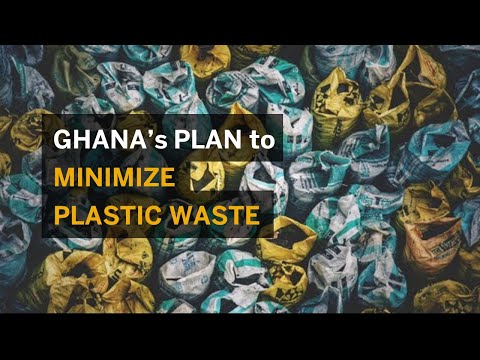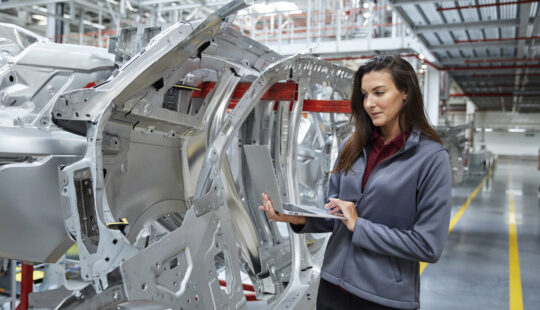Approximately 13 million metric tons of plastic waste enter the oceans annually, equivalent to one garbage truck load every minute. Even worse, the Pew Charitable Foundation estimates that the volume of plastics finding its way into the world’s oceans will triple by 2040.
Some experts believe the solution lies in creating circular economies, which eliminate single-use plastic in favor of organic materials or plastics that can be recycled and reused. But that requires significant investment and infrastructure.
In Africa, less than 20 percent of plastics are recycled currently, far below European Union targets of 50 percent by 2025. In lieu of formal recycling operations, waste pickers collect litter and sell it to middlemen, who aggregate plastic waste and sell it to recyclers abroad.
With a five percent recycling rate, Ghana has emerged as a regional front runner, committed to creating a domestic recycling industry that protects both the environment and the impoverished, mostly female community of waste pickers. Last fall, Ghana became the first African country to join the World Economic Forum’s Global Plastic Action Partnership (GPAP).

At a recent World Economic Forum Sustainable Development Impact Summit event, Plastics: From Global Vision to Local Action, panelists representing a coalition of governments, manufacturers, technology providers, and non-profit organizations discussed how Ghana is driving change.
Oliver Boachie, special advisor from the Ghanaian Ministry of Environment, Science, Technology, and Innovation (MESTI), said, “We see plastic waste as a threat to our way of life and danger to environment. But we also look at this as an opportunity.”
Since 2018, the government has been working on a plastic waste program that aims to clean up the environment, create jobs in the plastics value chain, make resources available to manage plastics, and help ensure no one gets left behind.
SAP is also a member of GPAP and has collaborated with MESTI, private industries, and local non-profits to create a technology solution that will help. Maggie Buggie, chief business officer of SAP Services, said, “The recycling systems in Ghana are very analog so we’re building a digital system to connect everyone and track the volumes and types of plastic, where it goes, and the prices paid across the value chain.”
With a foundation of reliable data, the government and private companies can determine where to invest resources and build recycling plants while also monitoring waste pickers’ wages and living conditions.
“By connecting the informal economy of waste pickers to the formal economy, we can help ensure they receive a fair wage and, later on, get services like training or childcare,” Buggie said.
Making the Invisible Visible: Improving Pickers’ Lives
Waste picking is a means of survival for poor, urban communities across Africa, Southeast Asia, and Latin America. In Ghana, they recover at least 218 tons daily, or nearly 12 percent of the total plastic waste generated.
But pickers have little visibility into the market price for what they have collected, which leaves them vulnerable to exploitation by middlemen. With the SAP solution, they will have mobile access to the average price for different kinds of materials. The government can use this data to monitor wages and take action to support pickers, for example, investing in social services that raise pickers’ living standards.
Jeffery Provencal founded rePATRN, a social enterprise that works with pickers. “We’re on the verge of an absolute game changer,” he shared. “We have a lack of data and the SAP solution is the best thing for it – one platform that provides all that data. We can find an efficient way to deal with the material, monetize it, and empower the waste pickers, so everyone wins.”
Private Sector Partners to Achieve Sustainability Goals
Adwoa Coleman, Africa Sustainability and Advocacy manager for Dow Packaging and Specialty Plastics, explains how technology will help the Ghanaian government and manufacturers achieve their sustainability goals.
“We have a goal that 1 million metric tons of plastics will be collected, recycled, or reused by 2030,” she said. “Data is critical to establishing a market where plastic can be bought and sold, depending on where that’s happening. Harnessing that data in one app will help fuel the circular economy and ensure that collected materials are reused.”
But success requires cooperation. “Stakeholder collaboration is important – we not only have the government, private sector, and NGOs, but also the collector and recycler. To succeed, we need to all be at the table,” Coleman explained.
Coca-Cola also has big environmental ambitions. For example, it wants all its packaging materials to be recyclable by 2035 – and has a specific perspective on what that means in West Africa. “Exportation of plastic and packaging waste out of Africa is not sustainable,” said Clement Ugorji, vice president for Public Affairs, Communications, and Sustainability. “We need the domestic capacity for collection, recycling, and reuse on the continent. That’s the only way to achieve a truly circular economy for Africa.”
For its part, SAP’s experience in the region developing SAP Rural Sourcing Management, a solution that supports small-holder farmers and improves visibility across agricultural value chains, offers an advantage. Since plastic pickers and rural farmers face similar issues, solutions like this can help all parties succeed.
The plastics recycling pilot project will run in Accra and several smaller cities in Ghana. Building on what is learned during this first stage, the coalition hopes to expand across Ghana, West Africa, and eventually the entire continent and other regions.



